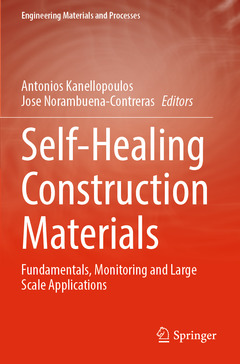Description
Self-Healing Construction Materials, 1st ed. 2022
Fundamentals, Monitoring and Large Scale Applications
Engineering Materials and Processes Series
Coordinators: Kanellopoulos Antonios, Norambuena-Contreras Jose
Language: English
Subject for Self-Healing Construction Materials:
Publication date: 12-2022
226 p. · 15.5x23.5 cm · Paperback
Publication date: 12-2021
226 p. · 15.5x23.5 cm · Hardback
Description
/li>Contents
/li>Biography
/li>Comment
/li>
This book provides a thorough overview of all techniques for producing self-healing construction materials. Construction materials (cement-based, bituminous, metals, and alloys) are prone to cracking, which with the progress of time can lead to compromising of the structural integrity of critical infrastructure. Self-healing materials form a new class of materials that have inbuilt engineered properties to counteract damage and repair it before it becomes critical. The methods for monitoring, modeling, and assessing self-healing are also reviewed. The final section of the book discusses the future outlook and potential extension of self-healing concepts to other materials (e.g., heritage structures and soils).
Fundamentals of self-healing construction materials.- Microencapsulation.- Bacteria based composites.- Shape memory polymers.- Flow networks.- Macrocapsules.- Autogenic approaches.- Metals and alloys.- Monitoring self-healing in construction materials.- Methods for monitoring recovery of mechanical properties.- Techniques for monitoring durability recovery.- Case Studies.
Antonios Kanellopoulos graduated with a B.Eng. (Hons) from Cardiff University in 2000 in Civil Engineering and obtained an M.Sc. and Ph.D. degrees in 2001 and 2004, respectively, from Cardiff University. In 2005, he joined University College London to undertake an M.Sc. in Project and Enterprises Management. His area of expertise is the development of new cement-based composites with unique properties, tailor-made to meet and satisfy the requirements, and challenges of both present and future infrastructure.
Antonios Kanellopoulos research has been published in 15 international peer-reviewed journal articles and in 30 peer-reviewed conference papers. He has also edited and co-edited two book chapters. Furthermore he has reviewed academic papers for more than 10 international journals, and he is also a member of the editorial board of Elsevier’s open access journal “Heliyon”.Explores the applications of self-healing construction materials
Contains a section on large-scale field trials of self-healing materials
Presents chapters by renowned academics all around the world that work on aspects of self-healing construction materials




